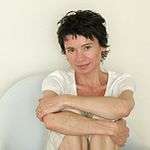Marie Sester
Marie Sester is a French-American artist who works with cross-disciplinary practices and experimental systems in Interactive Art using tracking technologies, light, audio, video, and biofeedback, focusing on social awareness and the responsibility of personal commitments.

Biography
Born in France, Marie Sester [1] studied to be an architect, earning a master's degree (Architect DPLG, M Arch) from the Ecole d'Architecture in Strasbourg, France.[2] While receiving recognition for her paintings and drawings, she moved to Paris and started traveling through Europe and Africa. After receiving a residency in Japan in 1993, her work shifted toward an exploration of public space, creating installations and experimental interactive works.[3]
In 2000 she moved to the U.S., living first in San Francisco, then in Los Angeles (she went back to Japan in 2001-02 as an artist-in-residence at Institute of Advanced Media Arts and Sciences, Gifu). She currently lives in New York City.[4]
Work
After she graduated, Marie Sester's interests shifted from designing physical structures to the study of ideological frameworks, specifically how culture, politics and technology affect our spatial awareness, our emotions and believes. For several years Marie Sester's work focused on notions of identity and awareness -how we shun or invite attention, exert or lose control of our personal or public spaces, and how we navigate through contemporary society's ever more ubiquitous systems of surveillance and monitoring on one hand, visibility and self-promotion on the other hand. Almost always placing the individual at its center, her work relied on literal interactions with its audiences, creating encounters where it is not clear if one has wandered into some sort of game -or stumbled upon something more sinister.[5]
Most recently her highest interest focuses on the nature of consciousness.
Shows and recognition
Marie Sester received grants from Creative Capital (2002),[6] LEF Foundation (2004), New York State Council on the Arts (2004 and 2011). She was in residence at the Institute of Advanced Media Arts and Sciences – IAMAS, Gifu, Japan (2001–02) [7] and Eyebeam, NY (2003).[8]
Her work has earned recognition in the art and technology worlds, including an Honorary Mention in Interactive Art from Ars Electronica (2003),[9] a Webby Award for Net Art (2004)[10] and a spot on the "50 Coolest Websites" list on Time Magazine Online (2004).[11]
Recently, her works have been included in the Seoul and Singapore Biennales (2008),[12] and installed at Glow Eindhoven, The Netherlands (2009),[13] SFMOMA, San Francisco (2010–2011),[14] EMPAC, Troy, New York (2010–2011),[15] and Z33, Hasselt, Belgium (2011).[16]
References
- http://www.sester.net/category/projects/
- https://www.amazon.com/Art-Electronic-Media-Themes-Movements/dp/0714847828
- http://www.we-make-money-not-art.com//archives/2006/10/you-have-a-back.php
- http://www.sester.net/category/projects/
- http://www.sester.net/statement/
- http://creative-capital.org/artistprojects/filter/year/year:2002#textContent
- "Archived copy". Archived from the original on 2010-05-02. Retrieved 2013-04-27.CS1 maint: archived copy as title (link)
- http://eyebeam.org/people/marie-sester
- http://www.aec.at/bilderclient_en.php?iAreaID=85
- "Archived copy". Archived from the original on 2011-07-22. Retrieved 2006-12-22.CS1 maint: archived copy as title (link)
- http://www.time.com/time/techtime/200406/fun.html
- http://www.universes-in-universe.de/car/singapore/eng/2008/txt/SB-2008-print-eng.pdf
- http://www.gloweindhoven.nl/glow_archive/glow2009/informatie/gb_informatie.html
- http://www.sfmoma.org/exhibitions/408
- http://uncertain.empac.rpi.edu/
- http://www.z33.be/en/projects/architecture-fear